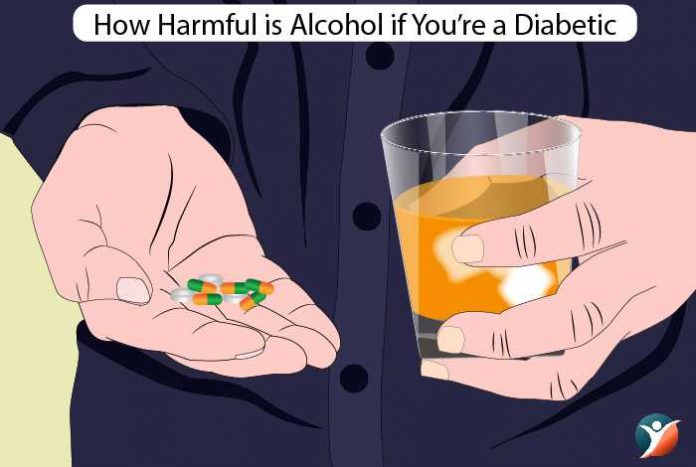
If you just got impressed by the quote or didn’t catch the obvious sarcasm above, then alcohol might be flowing through your veins and stimulating blood sugar levels. You need to know what alcohol and diabetes can do when mixed together.
Do you really think that you’re no longer a part of time-honored rituals like popping a champagne bottle and clinking glasses for a toast, just because you’re a diabetic? If yes, then you might have mistaken alcohol as a deadly weapon.
But, facts are absolutely unsure as they state ”complications depend on several factors when you’re a diabetic and from lifestyle choices to the size of your drink, every teeny-tiny factor has its own impact on your health.”
Not everyone is an alcoholic, but most of us are! And this is where the real question arises ”Can I drink alcohol if I have diabetes? ” So, here’s everything that you need to know about alcohol and diabetes to stop your blood sugar levels from skyrocketing or deep-sea diving.
Table of Content
- Alcohol and Diabetes
- Effects of Alcohol on Diabetes
- Alcohol and Increased Risk of Liver Damage with Diabetes
- Alcohol Consumption and Diabetes “Do’s and Don’ts”
- Alcohol Consumption with Insulin and Other Diabetes Medications
- Gestational Diabetes and Alcohol
- How Much Alcohol Is Too Much?
- Benefits of Moderate Alcohol Consumption
- Know Your Drink
- Bottom Line
- Conclusion
Diabetes and Alcohol
Consuming alcohol may result in blood sugar rise or fall in diabetics. If you have a taste of booze you can do it occasionally and only when your diabetes is well under control. Moreover, it is a good idea to talk to your doctor and see if alcohol is safe for you or not.
Alcohol affects every life differently depending on your gender, age, body weight and absorbing capacity. People using insulin to treat their diabetes can face some serious health issues such as diabetic eye disease and diabetic nerve damage from even moderate alcohol intake.
You might be wondering if drinking alcohol is safe for diabetes or not, but before revealing this fact you need to know more about alcohol safety and its association with diabetes.
Effects of Alcohol on Diabetes
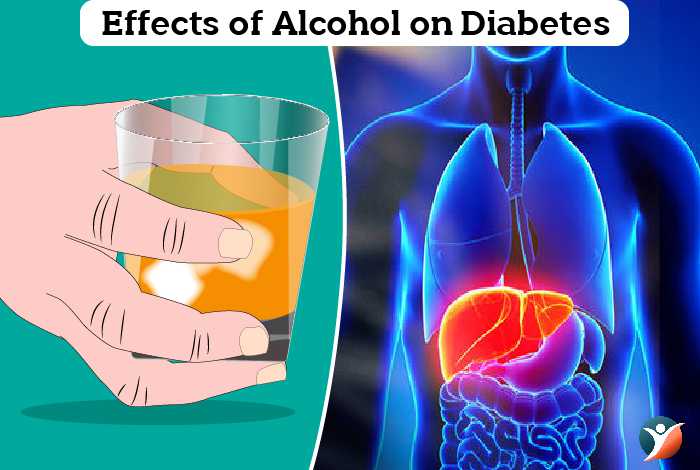
You might find alcohol following you everywhere. From family reunions to picnics, and the pool parties to summer break meets, alcohol will always tempt you to have a sip. And it’s up to your will and how determined you are to control blood sugar levels and prevent any serious health complications. Below are some effects of alcohol on diabetes of a diabetic:
- Moderate alcohol intake may increase your blood sugar levels, but excess alcohol can actually lower blood sugar. Sometimes, it may drop these levels to a dangerous point that can cause some serious trouble, especially for diabetics with type-1 diabetes.
- Alcohol stimulates appetite that can overheat your body and may also affect your blood sugar level.
- Usually, alcoholic drinks contain a lot of calories due to which you might face more difficulty in losing excess weight.
- Regular alcohol consumption also disturbs your mental abilities (Willpower or Judgment) and you start to make poor food choices.
- If you’re on oral medicines or insulin, then it can also interfere with your positive effects.
- Timely or regular alcohol consumption may increase blood pressure in diabetics.
- It may also increase triglyceride levels in your body.
Alcohol and Increased Risk of Liver Damage with Diabetes
After every sip of booze, you take, your liver decreases the amount of glucose release to prevent mixing of alcohol into the bloodstream. Once it stops producing glucose, the risk of developing hypoglycemia increases in people with diabetes especially when someone drinks on an empty stomach or a while after insulin medication or glucose-lowering tablets.
Liver functions to cleanse the blood, but it gets overloaded when you drink more than it can process. In this situation of overburden, liver could possibly damage because of alcohol. In people with diabetes, liver functioning becomes more crucial as it helps to regulate and maintain blood sugar levels.
Diabetics can easily develop these complications due to liver damage of malfunction:
- Jaundice
- Vomiting or Nausea
- Pain or swelling in the abdomen
- Liver damage
You cannot undo the damaged caused to the liver. This is why experts suggest that prevention is always the key and moderate drinking is advised to prevent liver disease or damage.
Alcohol Consumption and Diabetes “Do’s and Don’ts”
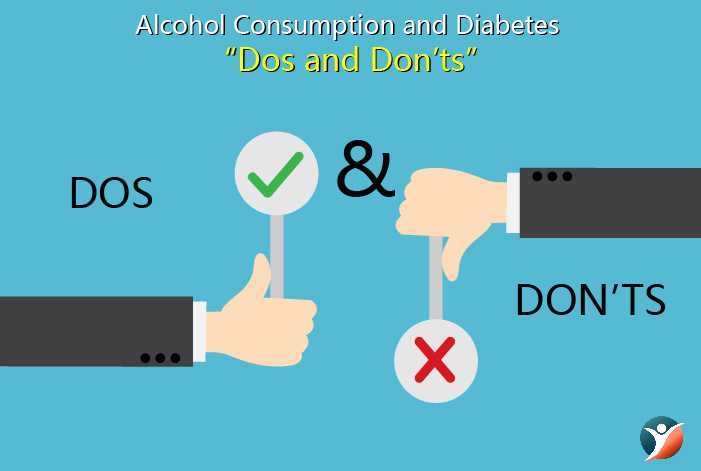
Being a diabetic doesn’t mean that you’re no more a part of the society, but if you really want to enjoy drinking then you need to know the connection between alcohol and diabetes and act accordingly. Know the worth of being healthy. Educate yourself and others to smartly handle the complications, if occur. Here we’ve listed some preventive measures to follow in order to feel the joy:
Do Not Drink on an Empty Stomach:
Never ever skip your meals when your pick any alcoholic drink, particularly if you’re under glucose-lowering medication. This might cause hypoglycemia and other health complications that may worsen your diabetes. It is advised to plan your meal before drink and know about your blood sugar to prevent any casualties.
Limit Carbohydrate and Calories with Alcohol:
Avoid mixing high-carbohydrate and high-calorie drinks such as daiquiris and margaritas with alcohol. You must have an idea of calorie content and harmful results of your drinks. You can lower the carb count by option light options like beer, wine, or a distilled spirit shot.
Practice Moderation:
You can stick to a better health with a well-planned schedule and not using alcoholic beverages to quench your timely thirst. You can have a no-calorie or a non-alcoholic drink with your meals.
Carry Emergency Glucose:
If you’re at a risk of serious issues like hypoglycemia, ensure to carry an extra set of glucose-lowering tablets, liquid, or gel with you. You might probably get regular soda or juice to treat sudden fall, but it is advised to take preventive measures for on hand treatments and avoid further risks.
Test, Test, Test:
Blood sugar levels are considered safe at 90-150 mg/dl before any alcohol consumption. If this level is less than 70 mg/dl and you’re on medications to lower your glucose levels then you should first treat this high blood sugar condition to prevent an emergency. Frequent glucose checks are the best way to know and learn how your body responds to a particular alcoholic drink.
Educate Companions:
Educate and alert your family and friends about serious conditions and how they differ from nonalcoholic health issues. Tell them how to check body blood sugar, doing this would help and treat you with first. Also, aware and encourage them to call helpline 911 to reduce the risk of sudden crisis.
Wear Diabetes ID:
Diabetes ID can help you in getting rapid care and treatment. This will help people to identify that you have diabetes and they’ll give you proper care and call for help. Your health is in your hands and it’s up to you what is wrong and right, so think before your drink.
Alcohol Consumption with Insulin and Other Diabetes Medications
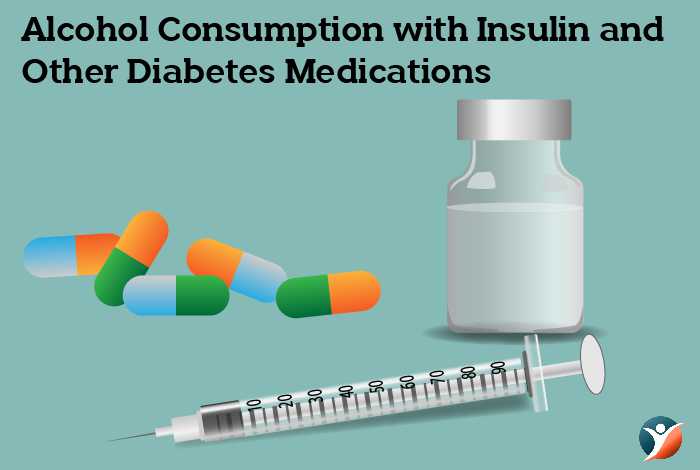
Consuming alcohol with or without medications can increase the risk of a gradual drop in your blood sugar levels. So, do follow the steps, especially when you’re on medications (insulin or any other diabetes treatment plan).
Before Drinking:
- Eat on-time and regular meals, medications and don’t forget frequent blood sugar levels checks to meet the healthy range.
Keep medications for low blood sugar with you (glucose tablets or six Life Savers®). - Always make sure you’ve someone with you who know the signs and symptoms of both high and blood sugar levels and also have the proper knowledge of how to treat the condition.
- You must know that glucagon (low blood sugar treatment) will not work with alcohol inside the body.
- Keep your MedicAlert® bracelet or diabetes ID handy.
While Drinking:
- Carbohydrate-rich food must be on your plate while drinking.
- Be your own bartender, always pour your drinks by yourself.
- Drink slowly, do not go bottoms-up.
- Your second drink should be non-alcoholic.
After Drinking:
- Tell someone responsible about your glass clinking parties.
- Do not forget to check blood sugar levels before going to bed.
- Set an alarm to get up on time to meet the medication schedule. Insulin and other medications should be taken on time. If missed, it can lead to ketones, high blood sugar, and diabetic ketoacidosis (DKA).
If you’re more concerned about the insulin and alcohol consumption, first talk to a doctor and tell about that you’re planning to have some booze. If you’re using a basal pump, doctor would suggest you to lower the basal rate or reduce the insulin dosage according to the health condition and blood glucose levels.
Be honest with your health-care expert to make appropriate adjustments of medications. Double check everything with experts and then you’ll get to have some moments of intoxication.
Gestational Diabetes and Alcohol
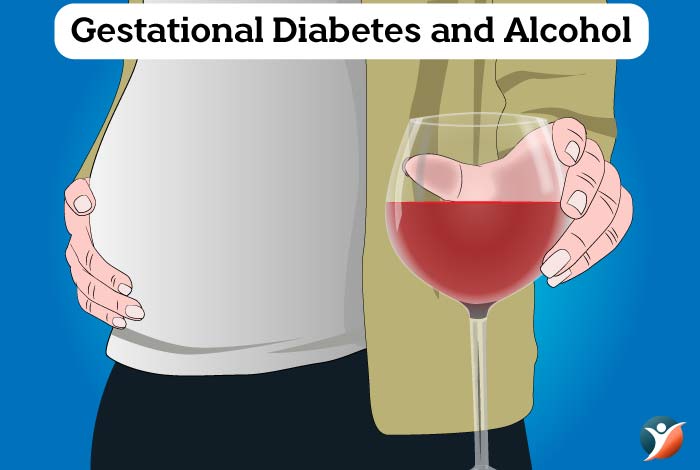
When you think of starting a family, it requires a bit more planning and prevention when you’re going to be a mother with complications of diabetes. But, just with some simple steps and health tips, you can ensure the baby’s safety and health during and after the pregnancy.
Gestational diabetes is a critical health condition that can affect pregnant women. While you’re pregnant, high blood sugar is a common issue that can cause trouble for both mother and baby, if not controlled on time by taking preventive steps.
All women, including who have gestational diabetes are advised to refrain from alcohol during pregnancy period to ensure the child’s birth and health. Increase in blood sugar levels can have catastrophic results that may affect your motherhood and life.
Consuming Alcohol While Pregnancy Can Lead to:
- Brain damage in the child, including speech, language delays, and learning disabilities
- Miscarriage
- Fetal Alcohol Syndrome
- Hear defects
- Premature birth
- Stillbirth (birth of a lifeless child of 20 weeks)
- Low birth weight
How Much Alcohol is Too Much?
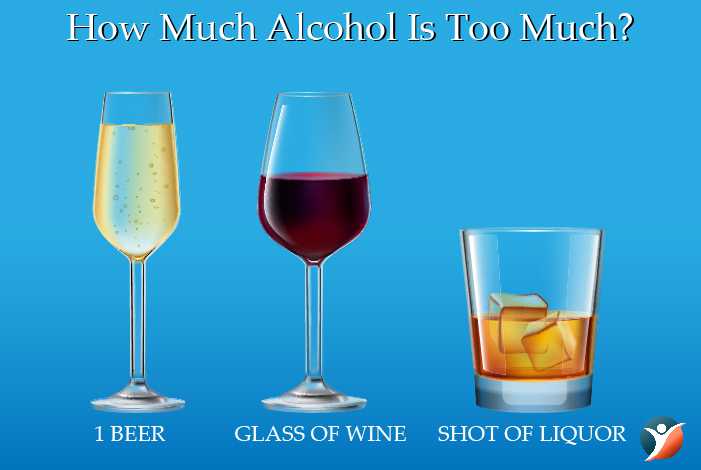
No one is allowed to drink, whether they have diabetes or not, but we still do. So, if you’re an adult diabetic, you can drink alcohol by following the same guidelines as for the general public. One should not exceed alcohol consumption by 3 drinks a day.
Pointing towards the blood sugar levels, researchers show that a moderate amount of alcohol have minimal or long-term effects on diabetics with type 1 and type 2 diabetes.[1] But, if you increase its intake then you might face serious challenges to keep it under control.
Here’s the recommended amount that one can consume after talking to a healthcare expert and taste the ferment.
Women:
- 2 alcoholic drinks/day
- Less than 10 drinks/week
Men:
- 3 alcoholic drinks a day
- Less than 15 drinks in a week
Benefits of Moderate Alcohol Consumption
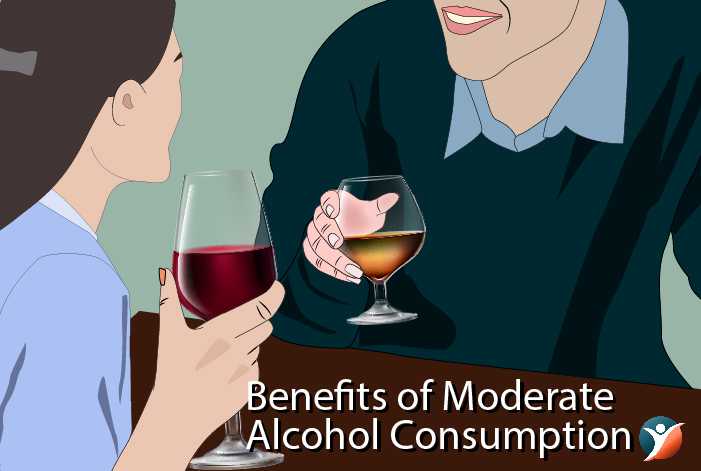
It may sound like a mixed message but you may experience some health benefits from moderate consumption. Like everything, it also has its cons more than pro’s but let’s think of the brighter side and know more about your drinks and their positive health impacts.
When we talk about alcohol consumption, moderation is the key. But, if you don’t drink then it is suggested not to start taking alcoholic sips. Here’s a bit closer look at the association between alcoholic beverage consumption and health benefits.
Reduces Risk of Diabetes:
Moderate and limited alcohol intake can surprisingly reduce the risk of developing type-2 diabetes. According to a study reported in 2005, people who consume alcoholic beverages in a moderate amount are found to have better blood sugar levels than those who do not consume alcohol.
Boosts Brainpower:
Apart from the downsides of alcohol on the brain, this may boost your brain health and prevent cognitive decline. A team of researchers from Loyola University reported that moderate drinkers develop serious issues such as Alzheimer and dementia by 23 percent less than non-drinkers.
Lowers the Risk of Cardiovascular Diseases:
School of Public Health Harvard University reported that moderate alcohol increase levels of HDL (good cholesterol) which protects your heart against a variety of diseases. It may also boost cardiovascular health and reduces the risk of heart attacks and common strokes.
Gallstones Won’t Create any Trouble:
Moderate drinkers are less likely to be affected by gallstones. It affects your gallbladder cholesterol to maintain a healthy weight and prevent the formation of cramp and pain causing gallstones.
Remember: These possible health benefits do not outweigh the risks*
Know Your Drink
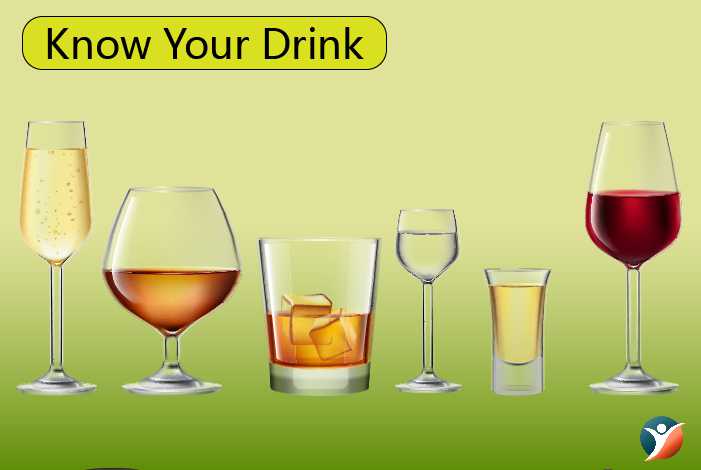
Alcohol is low in nutrients and high in calories. This is why it is also called ”empty calories.” If not managed and taken moderately it may cause serious health complications including triglycerides or elevated blood pressure, which raises the risk of heart diseases, especially in diabetics. So, it’s better to know your drinks from a bit closer to get an idea about the calories and carbohydrates that you’re taking with every sip.
Table below lists some popular alcoholic beverages/drinks along with their average serving size, calorie and carbohydrate content.
| Beverage/Drink | Serving Size | Calories | Carbohydrates (grams) |
| Regular Beer | 12 oz | 150 | 13 |
| Light Beer | 12 oz | 100 | 5 |
| Red, White, Rose Wine | 4 oz | 80 | trace |
| Wine Cooler | 12 oz | 30 | 215 |
| Champagne | 4 oz | 100 | 4 |
| Rum, Whiskey, Vodka, Scotch | 1 ½ oz | 100 | trace |
| Margarita | 6oz | 205 | 29 |
| Martini | 2 ½ oz | 156 | trace |
| Sherry | 2 oz | 74 | 2 |
| Cognac, Dry Brandy | 1 oz | 75 | trace |
It displays alcohol content in beer, red wine, margarita, and other popular alcoholic drinks that you might be planning to pick at your next party. So, before making your move to the bar, check your blood sugar and don’t forget to take your diabetes ID with you.
Bottom Line
- If you’re a non-alcoholic soul, please don’t start drinking alcohol.
- If you really choose to drink alcohol, do it in moderation. Be sure about the ways to treat and handle emergencies.
- Heavy alcohol drinkers are strongly advised to reduce alcohol consumption. It will make handling blood sugar levels more difficult.
- Talk with your doctor, diabetes educator or a health-care expert to get a professional perspective on every query related to diabetes and alcohol association.
Conclusion
After this much discussion and information on alcohol and its association with diabetes, you must be thinking of raising a toast. But, before going anywhere else or turn on your party mood, get an idea of what you’re drinking and double check your blood sugar levels.
Alcohol is not a problem but only when taken in moderate amount. if you experience issues with blood sugar levels, then visit your health-care expert to know about your health condition and ask if you can continue alcohol consumption with diabetes.
This is not a post to encourage non-alcoholics to start drinking but alcoholics can quit this habit to control blood sugar levels and meet unparalleled health goals.
If you loved the information or it helped you in controlling your blood sugar levels, don’t forget to share it with your family and friends. Because you never know how a simple piece of information can help someone to meet a breakthrough in their life. You can share your experience in the comment section, we are open to suggestions and feedbacks that help us to improve our standards. *Cheers! And remember moderation is the key.




